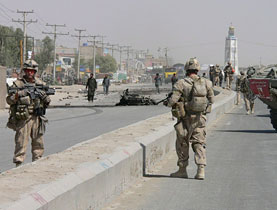
Western strategy “plays into Taliban hands”

The Western-led military alliance in Afghanistan is facing an ever greater challenge from Taliban forces, who have regained some 60 per cent of the country.
The Nato-led coalition, known as the International Security Assistance Force, has made errors that have played into the hands of the Taliban, and ending the war will not be easy, two Swiss experts tell swissinfo.
The Taliban – literally meaning “religious students” in the Pashto language – came to power in 1997, but were driven out without much difficulty by US and British forces and their Afghan allies, the Northern Alliance, in the invasion following the terror attacks in the US of September 11, 2001.
But since then, the Taliban, Sunni fundamentalists who for the most part belong to the majority Pashtun ethnic group, have with growing success harassed Western forces and those loyal to the government of President Hamid Karzai, from bases in the frontier provinces of Pakistan.
Today the Taliban can move freely through much of Afghan territory, making good use of its mountainous terrain.
Ethnologist Pierre Centlivres, who knows Afghanistan well, does not find the comeback entirely surprising.
“The way the Afghans see it, Western troops are occupying their country, although officially they are simply there to support the Karzai government. This military presence is all the less acceptable because it has been responsible for a number of blunders which have killed civilians,” he explained to swissinfo.
“Nevertheless, not all Afghans support the Taliban. Some still think the presence of foreign troops is a necessary evil. But there are fewer and fewer who think this way, whereas just two years ago they were in the majority.”
Foreign bodies not welcome
Centlivres points out that there are different aspects to the foreign intervention: military and civilian.
Taken together, the aim is to help the battered country to get back on its feet.
Afghanistan has been in a semi-permanent state of war ever since the Soviet invasion in 1979. Against this background, the state embodied by the Kabul government had never succeeded in imposing its writ on the country’s different ethnic groups, tribes and clans.
“Most Afghans regard not only the presence of foreign troops as a humiliation, but also the attempt to establish Western-style democracy and justice based on a constitution inspired by foreigners. Afghans now see their country as not being merely under foreign influence, but being treated as a trust territory,” he added.
Terrorism expert Jacques Baud, who recently returned from Afghanistan, agrees.
“The Afghan mentality reflects their geography, in a way. Most of them are mountain people… with little interest in the outside world,” he told swissinfo.
“They are not asking the West to make big investments or to modernise their country. They want to develop at their own pace, in their own way, and in accordance with their own culture.”
In other words, those who believe Nato should step up its civilian presence are likely to be disappointed.
“It’s an illusion to expect to win over hearts and minds. It’s a good thing to do good, but it is difficult to be liked when you bomb a village and then make amends by paying out dollars,” Centlivres warns.
Appeal of nationalism
The Western coalition has made numerous errors – partly because it has set itself too many goals (fighting terror, bringing about development and democracy), Jacques Baud believes. This has helped the Taliban find recruits far beyond their usual support base.
“Uighurs, Tajiks and Uzbeks are joining the Taliban in the name of defending Islam,” he says.
It is an ideological struggle, which also draws Arab, Chechen and European volunteers, and finances from the Gulf, according to Centlivres.
“But the Taliban are also recruiting in the name of nationalism and rejection of foreign occupation. This nationalism seems to be even more important that their basic stock in trade, which is Koranic morality, fundamentalism and sharia law,” he said.
They now have control of about 60 per cent of the territory, and their opponents are clearly at a loss what to do. Baud sees the Western alliance making the same mistake as the Soviets: they concentrate on the cities and main transport routes, and leave the countryside to fall into Taliban hands.
Pakistan, India and Iran
Baud is convinced that the Western alliance cannot win militarily, and at some point will have to negotiate. He points out that the Taliban have never been on the US list of terrorist organisations, probably in order to leave the door open for talks.
But Centlivres points out that negotiating is likely to be as difficult as fighting, and that the Taliban are not the only issue.
In any case, any peace talks would have to include Afghanistan’s neighbours, Pakistan, India and Iran, who are directly concerned and involved in what happens there.
swissinfo, based on an article in French by Frédéric Burnand in Geneva
The Swiss Agency for Development and Cooperation (SDC) has been in Afghanistan since 1977.
Since 2004, the Swiss programme has been gradually changed into a long-term programme aimed at development and reconstruction.
Its current activities are aimed at encouraging good governance, respect of human rights and improving the standard of living of the poorest groups in the community.
Switzerland allocated about SFr 21 million ($19.3 million) to Afghanistan in 2007.
The Swiss defence ministry withdrew the Swiss officers attached to the Nato forces in 2007. Until then there had been between two and four officers on the ground.

In compliance with the JTI standards
More: SWI swissinfo.ch certified by the Journalism Trust Initiative




























You can find an overview of ongoing debates with our journalists here . Please join us!
If you want to start a conversation about a topic raised in this article or want to report factual errors, email us at english@swissinfo.ch.